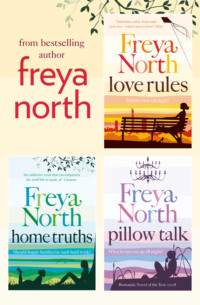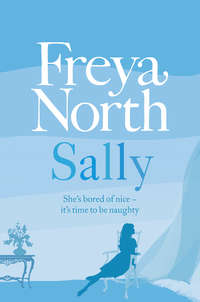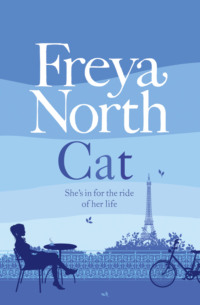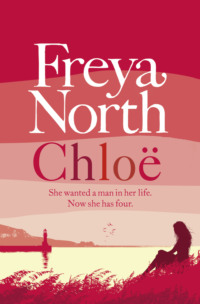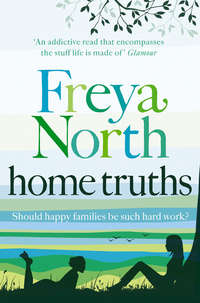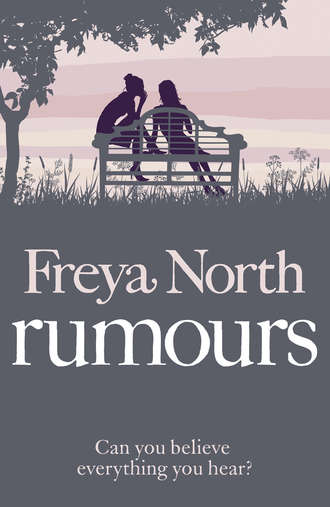
Полная версия
Rumours
Chapter Seven
With a dog under one arm and three-year-old Sonny wriggling under the other, Caroline Rowland manoeuvred the buggy with her foot so it didn’t block the entrance to the Spar. She then plonked the dog beside it with a look that said Stay – Or Else, and into the shop she went, managing to buy only what she’d come in for and cajole Sonny into thinking the dried apricots were his idea of a snack.
Caroline made multitasking appear effortless and her willowy beauty was unruffled by the daily challenges of two very young children, a dog and a husband who commuted to London. Her self-deprecating sense of humour, delivered in her upbeat Geordie accent, helped – as did a copious supply of Nicorette gum. She was one of Xander’s closest friends and that they should live in the same village, having met nearly two decades ago at Nottingham University, was no coincidence. They’d dated, briefly, or rather they fell into a bit of late-night snogging at the Students’ Union disco in Freshers’ Week, but neither of them could remember much about that. It wasn’t long after that that Caroline met Andrew and adopted the role of older sister to Xander (though she was in fact younger by two years) and Xander, an only child, couldn’t believe his luck, or what he’d been missing all those years. After university, they’d all shared a house in Highbury and then, when they finally decided that they’d be grown-ups – and Caroline married Andrew and Xander set up his own company – they all ended up in Long Dansbury.
The village’s links by road and rail to London meant that Andrew had the best of both worlds – miles of track to run with Xander, as well as a tolerable commute into work. For the children, having Xander close by was brilliant because he loved watching SpongeBob, he was always up for kicking a ball even with a three-year-old, or rough-and-tumbling over their mum’s furniture, and best of all she told him off far more than she scolded them. The Rowlands had lived in the village for six years, the children had been born there and Caroline loved the way that, despite this and despite all the activities she joined in or indeed organized, she was still frequently referred to as ‘Caroline – the Northern Lass’ as if Newcastle was somewhere very foreign and rather exotic.
‘Hullo Caroline, dear,’ Mrs Patek, shop owner, greeted her. Deftly, Caroline chatted back whilst shaking her head before Mrs Patek could say, sweetie for Sonny? and the little boy remained none the wiser. ‘It’ll shake the village, wouldn’t you say?’
‘What – Mother Refuses Son E-Numbers and Sugar?’
Mrs Patek laughed. She was proficient at holding down umpteen conversations at once whilst packing the shopping, doing mental maths before the till came up with the total and managing to remain resolutely jolly all the while. ‘I was just saying, dear, to Nora here, that it’ll shake the village.’
‘What’ll shake the village, pet?’ Caroline asked.
‘She hasn’t heard yet,’ said Nora who needed drama daily and added it to most topics of conversation. She sucked her teeth thoughtfully. ‘Longbridge Hall – it’s for sale.’
‘Never!’ Caroline was surprised. Xander had said nothing about it when he’d popped over to watch the football with Andrew last night – and if anyone was to know, it would be Xander.
‘Nora, dear, we really must say “apparently” until the sign goes up,’ said Mrs Patek.
‘Apparently,’ Nora conceded, touching her blue-rinsed perm as if to check it was still there.
‘How do you know?’ asked Caroline.
‘Her Ladyship was in here the other day, when Mercy was in here, and I overheard her saying “Denby’s?” but Mercy said, “No, Elmfield’s.” And then Her Ladyship asks Mrs Patek here for a piece of paper and wrote down something about someone at Elmfield’s.’
Caroline put her change in her purse, hitched Sonny on her hip because he’d decided he couldn’t possibly stand, let alone walk, and took her shopping from the counter. ‘Perhaps Longbridge isn’t for sale – perhaps Lady Lydia fancies a spot of gazumping.’ It all sounded so far-fetched.
‘Gazumping!’ Nora was thrilled. ‘What’s that?’
‘Perhaps she fancies Mercy’s cottage – and is going to make a higher offer.’ Caroline was jesting but Mrs Patek and Nora considered this gravely.
‘The Fortescues have always thought they own the village,’ said Nora.
‘They mostly do,’ said Mrs Patek.
‘Maybe Her Ladyship is making sure of it,’ said Nora. But she, too, couldn’t really imagine Lady Lydia selling – she must be buying.
‘She’ll never sell me that plot of land opposite my shop – even though you all think it’s the shop’s car park.’ Mrs Patek paused. ‘She can’t be selling. Why would you move if you owned a place like that? And anyway, she’s part of things. And really, we’re all part of Longbridge.’
‘If Lady Lydia is doing a gazump, then I wonder if Mercy’s happy about that. Mind you, if it’s more money, she’s likely to be. She’s from Scottish stock, you know – they like their money, that lot,’ said Nora.
‘And I like brown ale and coal, me,’ Caroline laughed. ‘I’ll see you ladies later. Ta-ta,’ and, smiling to herself, she walked away.
‘But if Longbridge is sold – what’ll it mean for the village?’ she heard Nora say.
As she pushed the buggy, maintained a conversation with Sonny and navigated the dog who had a tendency to wander into the path of anything, stationary or mobile, Caroline texted Xander.
Rumour has it Longbridge is on the market … Cx
The reply came almost immediately.
Bollox! Xx
What a lot of X’s he uses, thought Caroline.
Xander texted again, before she’d replied.
Where did you hear that?!
Village Shop
I rest my case … Xx
‘Mum?’ The front door was unlocked and Xander stood in his mother’s hallway thinking, if I was a burglar, I could swipe her handbag, her car keys, various pairs of shoes, library books, two terracotta plant pots and a selection of Paul Newman DVDs by barely crossing the threshold. Last week, her car keys had been in the car, actually in the ignition; the passenger seat piled high with interestingly bulky Jiffy bags ready for posting and a clutch of Steve McQueen films loaned from Mrs Patek’s esoteric DVD-rental service.
‘Mum?’ Where was she?
‘Hullo, darling!’
She was behind him, making her way up the garden path.
‘Mother – what are you doing?’
‘Your dad forgot his jacket – it’ll be chilly later on. I don’t want that bronchitis coming back.’
Monday night – card night at the pub.
‘But you left your keys.’
‘I didn’t lock the door.’
‘Exactly – you left everything in here.’
‘Xander!’ she chided and laughed. ‘Stop worrying! I only popped out – I’ve only been gone five or ten minutes. Don’t start putting the willies up me about thieves and the like. This is Little Dunwick, remember.’
‘It’s cloud cuckoo land.’
‘Don’t be cheeky.’
Xander shrugged.
‘You think Long Dansbury is small and friendly – well, here in Little Dee, we’re a tiny happy family in comparison.’
Xander smiled as if he acquiesced. His mother still needed to justify her move away to this neighbouring village over a decade ago.
‘Come on in and give your old mum a kiss.’
Audrey Fletcher made herself sound ancient though she had only recently celebrated her sixty-fifth birthday and looked much younger albeit in a windswept way. She had thick, iron-grey hair worn at one length to her shoulders and a fringe she kept too long so that she blinked a lot, which gave the impression that she was always concentrating hard when actually she chose to listen only selectively. It drove Xander mad, but his father greatly appreciated it, not being one for involved conversation. If Audrey lost track of what people were saying, she never asked them to repeat themselves, she never interrupted and she never murmured, ‘Hmm?’; she simply smiled and blinked in a calmingly beatific way, which gave everyone the impression that she liked them very much and was pleased for them to talk at length. This, combined with the way she dressed – loose trousers or long skirts overlaid with smocks in heavy fabric and a penchant for Native American patterns and colours – invested her with the semblance of someone worldly, wise and contemplative; a modern oracle, a latter-day soothsayer.
In her day, she’d been the only member of staff at Longbridge to resolutely refuse to wear uniform without having to say a word. Certainly, she didn’t dress like the Norland Nanny who predated her there and if the Fortescues had requested a uniform, she probably didn’t hear them. (Lydia was privately quite sure that the clothes Audrey wore now were the same as then – and secretly, she marvelled at the longevity of such fabric.)
Xander kissed his mother. She cupped his face in her hands and smiled at him.
‘Let me look at you.’ She’d seen him the week before. ‘How’s my boy?’
‘He’s fine.’
‘Soup?’
He followed her into the kitchen and sat down at the table. It came naturally to Xander to say a sentence at a time and wait for her to respond; that way nothing was wasted and everything was heard.
‘If you must leave the door unlocked, please don’t leave your valuables in the hallway.’
‘It’s leek and potato.’
He didn’t respond.
‘I’ll try to do that, Xander – for you, rather than to fox any neighbourhood villain.’
Good. ‘Leek and potato sounds good.’
‘How’s work?’
‘Not bad. How’s Dad?’
‘Very good.’
‘This is delicious.’
‘You can come again!’
‘Thanks, Mum.’
‘You saw Lydia recently?’
‘Yes – and Caroline overheard some village gossip about Longbridge going up for sale.’
‘Longbridge?’ Audrey laughed. ‘How absurd.’
‘I thought it would tickle you.’ Xander laughed with her. ‘But you know what Nora’s like – if there’s no real gossip, she’ll invent some.’
‘I’m visiting Lydia later this week – I’ll ask her. Mind you, a rumour without a leg to stand on still gets around somehow.’
‘I can imagine her response,’ said Xander. It was not unknown for Lydia to hiss the word ‘peasants’.
‘I thought I’d take a stew. I don’t like the thought of Mrs Biggins lifting heavy pots – despite the size of her we have to remember she’s nearly as ancient as Lydia and not nearly as strong as her mass would suggest.’
‘You’ll say it’s leftovers.’
‘Yes – and Lydia will laugh and be very rude to me but she’ll eat it all up and never let me know if she liked it.’ She looked at her son thoughtfully. ‘Will you take some soup home with you?’
‘It’s delicious – but I’m out most evenings this week.’
She looked at him again. ‘Oh, yes?’
‘Clients.’
‘Clients – oh, yes?’
‘No one you know,’ he said and they laughed at his pat answer.
‘One day you’ll surprise me,’ Audrey said. ‘One day you’ll come over and say, Mum! Meet Amanda!’
‘Who the hell is Amanda?’
‘Amanda is simply generic, Xander. You know what I mean.’
‘Mother – will you please just leave it?’ He was serious. Why was everyone so concerned with marrying him off? ‘I should have married Verity Fortescue when she proposed to me when I was seven years old.’
‘I had a letter from her last week. Which reminds me – did I post my reply?’ Audrey tailed off to rummage through a pile of paper on the dresser and found the postcard she’d written Verity. ‘Blast.’
‘I’ll post it – and yes, I’ll put a stamp on it for you!’ Xander said wearily, but in jest. He noted the postcard depicted an illustration from an old Enid Blyton book. He skimmed over his mother’s blowsy handwriting, not dissimilar from Verity’s.
‘When did I last see Verity?’ Xander said quietly.
‘She didn’t come at Christmas.’
‘She doesn’t “do” Christmas any more,’ Xander said.
He and Audrey shared a wistful moment, quietly recalling those long halcyon days of his childhood when he and Verity were together from sun up to sun down. Playing and laughing and climbing and swimming and imagining a time when they’d be grown-ups and Longbridge would be theirs and they’d paint everywhere purple and green and pink and blue and there’d be lollipop trees in the garden and the hens would lay chocolate eggs and there’d be cows in the meadows who’d give them strawberry milkshakes.
Xander dreamt of Verity that night. They were in the clock tower above the stable courtyard at Longbridge only it wasn’t Longbridge, not that it mattered. In the dream, he was young again – he could see himself with his ridiculous pudding-bowl haircut and his knock knees and some dreadful knitted sleeveless pullover his gran had made for him. He could taste the musty air that squeezed through the gaps in the tower as skeins dancing with dust. The silken waft of Verity’s strawberry-blonde hair as refined as his tank top was coarse. Their laughter peeling out like the long-gone bell in the tower. The day speeding away and yet time, up there, standing still. But it was grown-up Xander inside young Xander’s head, watching Verity. Smiling and laughing along with her but watching her closely, careful to make her feel equal and relaxed and normal, while all the time guarding her as if, at any moment, she might fall, or she might fly away or, worse, just fade from view and simply disappear. Verity – ethereal and beautiful and so very vivid – saying, Xander! Xander! Come this way! She was going for a door he’d never seen before. Come with me, Xander! But she disappeared beyond it before he could say, Verity – no, don’t! Please stay.
Chapter Eight
If one didn’t know of Longbridge Hall then one might well assume the gates off the high street heralded a country park. Certainly, Stella was surprised that in all her visits to Mercy Benton’s cottage in Long Dansbury, she’d never given more than a passing glance at them. On the Tuesday morning, at 11.00, she drove through the gates, noting how one was slightly crooked and both needed painting black again. Halfway up the drive, she said, oh God, where on earth is the house – I was here at 11.00, I’ve been going for miles and now I’m going to be late. However, even in the April shower that had suddenly descended, when the house came into view it was a breathtaking sight. Stella followed the driveway around it, until it ended in a flourish: a vast turning circle the size of a roundabout, with a small maze of box hedging at the centre. Stella checked her reflection and smoothed her hair and wondered if she should use the main front doors or what looked like a tradesmen’s entrance off to one side. She also wondered whether she should curtsey. Clearing her throat, she made her way past the two stone lions at the base of the steps leading up to the front door. She gave the bell pole a pull and then did so again, with more force, and heard it clanging inside the house.
‘Open the door, woman! Open the door!’
Stella panicked that the voice was shouting at her but even though she heaved her shoulder against them, the front doors were definitely shut.
Did she dare ring that bell again?
Luckily, a plump woman, wearing what her mother would call a pinny, opened one of the doors a fraction. She said nothing.
‘Hullo,’ said Stella.
‘Hullo.’
‘I’m expected.’
‘Who are you?’
‘I’m Stella – Hutton.’
‘One moment.’ The woman left the door ajar and disappeared. Was that Lydia? Lady Fortescue? Mrs Barbary?
‘Is it Elmfield?’ she could hear another voice asking.
‘No, it’s Stella Someone.’
‘Well, it’s probably Stella Someone from Elmfield’s. Gracious me!’
That must be Lady Fortescue.
The plump woman returned. ‘Are you from Elmfield’s?’
‘Yes,’ said Stella. ‘Sorry – I should have said.’
‘Come this way, please. Coat.’
But what Stella really wanted to do was stand still for a moment and take it all in. Beyond the entrance hall was the grand stairwell, lit from above by a beautiful glass lantern roof, a swooping double staircase leading upwards to a galleried landing. But her coat was being all but wrenched from her back.
‘I’m Mrs Biggins – I’m housekeeper here. Lady Lydia takes coffee at this time – would you like coffee?’
‘No, thanks. Well – just a glass of water, please.’
‘Or tea?’
‘Tea! Oh yes, please – I’m gasping for a cup.’
The woman looked her up and down. ‘You’ll take it strong – like me.’ Stella was unsure whether she was referring to her own strength or a well-brewed cup, whether the woman’s remark was an observation, or a statement not open to dispute. If the housekeeper was this disarming, what could Lady Fortescue be like? Mrs Biggins opened the soaring double doors in front of them and gave Stella a little shove. The room was so stunning, in a thoroughly Alice in Wonderland way with everything oversized, that momentarily Stella forgot all about locating the owner of the house and making her introduction. It was dual aspect, occupying three bays of the east front of the house and one bay south, and the four magnificent sash windows, at least eighteen feet high, flooded the room with light despite the dreary day outside. Stella was, quite literally, dazzled.
‘Good morning.’
Sitting in a wingback leather chair, Lydia slowly folded the Telegraph and placed it across her lap. Her knees were together, her legs neatly at an elegant angle; hair in a chignon with stray strands like spun silver. She wore a woollen skirt the colour of peat and a twinset the colour of heather. Her shoes were buffed and the decorative buckles shone. Neutral hosiery gathered just perceptibly in creases around the ankle – like a ploughed field seen from a distance.
‘Mrs Fortescue, I’m Stella Hutton.’ And immediately, Stella thought, oh God, I’ve addressed her incorrectly already. ‘Lady.’ No! That sounded plain rude.
Lydia did not rise. Indeed, she sat motionless and expressionless. ‘I see.’
‘I’m here on behalf of Elmfield Estates.’
‘Yes.’
Should she backtrack and apologize for the botched greeting? Stella was unsure. She didn’t know what she was meant to do next. Sit, stand, talk, wait, what? She was being looked at, assessed; she could feel it. It was as nerve-wracking as the one time she’d been hauled in front of the headmistress at the age of thirteen. She felt hot and self-conscious. Did she appear suitably estate-agenty? Or was the fact that she really didn’t do the navy skirt-suit and court-shoe thing actually in her favour? She was today wearing slim-fitting black trousers and black suede ankle boots with a Cuban heel and a white shirt. Perhaps she looked too much like a waitress. Damn it! She’d been in the pale blue shirt first thing, but had changed at the last minute. Perhaps Mrs Lady Barbary-Fortescue was waiting for her to be a little more estate-agenty. Perhaps she should deliver the Elmfield Estates mission statement.
What Stella really wanted to do was to sink into one of the sofas and say, wow, what an extraordinary place, how long have you lived here, tell me about the house, who is the lady in the painting – is it School of Reynolds? The rug is Persian, isn’t it?
She was enamoured by everything: the carved frieze above the fireplace of cherubs apparently hunting down a deer; the wealth of photos from sepia, to tinted, to full colour, in a crowd on the grand piano, the thick velvet drapes, the Chinese paintings on silk. The glass-fronted book cabinet. The vast silk rug – yes, most certainly Persian – threadbare in one or two places but still magnificent, yet which went only some way in covering the impressive run of wide floorboards. Huge, heavy columnar curtains with flamboyant pelmets that reminded her of a theatre. More furniture than she, her brothers and her mother had between them. Finally, she noticed the archaic-looking electric bar heater standing in front of the capacious fireplace, trying valiantly to take the chill off the room and adding a warm down-to-earthness too. If there was so much to look at even in this one room, what delights could the rest of the house hold?
‘Let me look at you.’
Stella felt like Tess being summoned by Mrs d’Urberville. But then she thought she remembered Mrs d’Urberville being blind and suddenly she felt very self-conscious that she really wasn’t smart enough and why had she popped her slightly greasy hair into a hasty pony-tail when she’d had the time to wash and dry it? As she approached, Stella decided to polish up her vowels and use words like ‘frightfully’ and ‘splendid’.
‘You’re not as I expected.’ Lady Lydia sounded disappointed. ‘But then, Mercy Benton’s powers of description have always been limited. She described her own daughter’s wedding dress as simply a “nice frock” and her son-in-law as a “nice lad”. She said you were a “fine woman” and “everything one could hope for” in an agent.’ She paused, as if waiting for Stella to take the bait. But Stella just nodded with a wry smile in a ‘Gosh, well – you know Mercy Benton’ kind of way.
Lydia rose a little shakily. ‘You look like a girl – a waitress.’ She was not impressed.
‘That’s probably why my clients like me, Lady Fortescue,’ Stella said meekly. ‘I don’t boss them around. I take their order – be it for a house or a sale – and I deliver it to them.’ Stella thought about it. ‘With no spillage.’
The women regarded each other. Though Lydia was pretty much the same height as Stella, her aquiline haughtiness made her appear far taller. Or perhaps Stella just felt small in this grand room in this phenomenal old house and, for the first time in her life, in the presence of someone titled.
‘And have you ever been in a house like this?’
Stella was diplomatic. ‘There can’t possibly be another like it.’
Lydia looked at her as if she’d seen straight through her words. ‘Mrs Biggins, wretched woman – she never came with my coffee. Would you care for a sherry?’
‘It’s a little early for me,’ Stella said as if she didn’t take her sherry until after lunch. Lydia looked at her witheringly, as if she’d heard sarcasm. She walked over to the walnut drinks cabinet and inadvertently chinked the crystal stopper against the decanter and then the decanter against the glass. She took her sherry and walked to the sofa, spilling a little on her skirt as she sat herself down. She motioned to the companion sofa opposite and Stella sat. Lydia took a thoughtful sip. And then another.
‘I detest Asians.’
‘I’m sorry?’
‘All agents – whatever their industry.’
Oh – agents.’ Stella’s relief was worn as an expansive smile which Lydia appeared to baulk at.
‘I am going to sell Longbridge,’ she said levelly, ‘or at least, you are.’
Stella felt herself sinking into the sofa, as if her surroundings were suddenly growing and she was shrinking under the weight of the realization that this is why she was here. This couldn’t be real – this had to be Lewis Carroll. A joke. A dream.
But Lydia was continuing. ‘I have been thinking about selling Longbridge for some time. Sometimes I stop thinking about it – but not because I’ve changed my mind. The whole concept is so very tiresome.’ She stared at Stella, who tried to nod purposefully and to stop gawping, wishing she’d said yes to sherry, just to have something to hold instead of her hands feeling like clodden sponges awkward in her lap.
‘I’m haemorrhaging cash in upkeep.’ Lady Lydia gave a little cough for emphasis. ‘It’s preposterous! All that money just to keep the rain out and the heat in.’
The look she threw Stella as she knocked back her sherry suggested she was waiting for a response.
‘I hope I don’t sound ignorant or nosy –’ Or obsequious, Stella thought to herself. ‘But would a house like this not be handed down to the next generation?’
‘There is no next generation,’ Lady Lydia barked before going heavily silent, staring into her sherry glass as if, usually, it refilled spontaneously. ‘I am the eldest of four girls. Cordelia died young. Anne never bred. She was a lesbian – still is, I believe, though at her age that’s quite unnecessary. Margaret moved to Connecticut and remained barren despite landing herself three American husbands in quick succession.’


